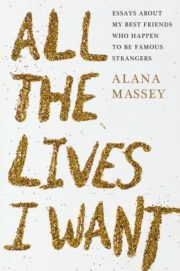 Essays About My Best Friends
Essays About My Best Friends
Who Happen To Be Famous Strangers
Alana Massey
Grand Central Publishing ($26)
by Lizzie Klaesges
At first glance, Alana Massey’s debut collection All the Lives I Want might appear to contain wistful affections for the many famous women included in her work. However, the book actually offers something much more pertinent to our culture’s portrayal of women. Massey’s attention is not for those females considered perfect by today’s social standards; instead she focuses on troubled, flawed, forgotten, and at times outwardly ridiculed women. This includes celebrities from Amber Rose to the Olsen twins to Nicki Minaj, Princess Diana, Anna Nicole Smith, Britney Spears, and more. In addition to female celebrities, she also includes a writer, Sylvia Plath, and fictional women such as the Lisbon sisters from The Virgin Suicides.
Massey challenges the false narratives that have been insistently placed upon these women—narratives such as Lil’ Kim and Nicki Minaj’s supposed “feud,” that Amber Rose is nothing but a stripper, that Mary Kate and Ashley Olsen can be viewed as a singular character, and so on—and she revitalizes these women by sharing her own stories of heartbreak, sex work, mental illness, and other subjects alongside their stories. Massey politely exposes the inherent inconsistencies of a culture in which these misjudgments are allowed to occur so casually. Her writing is shrewd, analytical, sad at times, and ruthless at others. Her essays are littered with web links in the end notes, reminding readers that she is a prolific internet writer, but unlike the typical internet column, her collection of prose is as elegant and literary as it is heartbreaking and entertaining.
Massey is often first to admit her own shortcomings and particular misuses of famous women, as she does in the first essay, “Being Winona; Freeing Gwyneth,” in which she separates Winona Ryder and Gwyneth Paltrow as “two distinct categories of women who are conventionally attractive but whose public images exemplify dramatically different lifestyles and worldviews.” Massey identifies with Winona’s awkward and authentic lifestyle rather than the more perfect but dull “Gwyneths,” whom Massey imagines “wearing overpriced clothing in colors like ‘camel’ and scowling at her staff.” Massey clings to her “Winona-ness” for comfort after a romantic interest leaves her for a Gwyneth. Realizing the unfairness of using a unique individual as a metaphor for her own suffering, Massey finds ways in which Winona and Gwyneth are both flawed, beautiful, and authentic women, and struggles to reconcile the two.
Often female narratives are distorted for personal enjoyment, likely that of men. In the essay, “Our Sisters Shall Inherit the Sky,” Massey diverts the focal point of The Virgin Suicides away from the five suicides and places it on the male observers, who are now narrating the story as grown men. The men became obsessed by fantasies of the Lisbon sisters, most clearly revealed when the boys watch fourteen-year-old Lux take lovers on her roof. The boys proceed to track down the male lovers for further details of the sexual encounters. Even long after the suicides, the men are enthralled by this perfect fantasy of mysterious young girls who never “aged into the fullness of living real human lives.” Yet, The Virgin Suicides is often received with the same misplaced excitement both by men who want the fantasy and by women who want to be admired in the same way.
The title of the collection is taken from the most popular Sylvia Plath quotation on Goodreads: “I can never read all the books I want; I can never be all the people I want and live all the lives I want.” Although Massey admits she did not initially feel inspired by this quotation, she later hears it in its proper context where it continues to say, “Perhaps that’s why I want to be everyone—so no one can blame me for being I.” Massey does not necessarily wish to inhabit all the lives she mentions in the collection, as much as she, like Plath, is fearful of exposing her true self to a world that makes harsh judgments. The famous women in this book all have been mocked or disregarded in some way. Massey does not wish to save these women, but she does believe they deserve to be understood.
